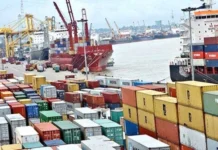By Mahbub Leelen and John Bechtel on Apr 05, 2022
Benar News

Despite deep ties to India, Bangladesh is growing closer to China because of “baskets of money” that Beijing offers to help the smaller South Asian nation develop its economy, Foreign Minister A.K. Abdul Momen told an audience Tuesday in Washington.
Momen was visiting the American capital this week to hold talks with U.S. officials as the two countries mark 50 years of diplomatic relations. On the world stage, Bangladesh strives to be friendly to all nations while carefully balancing its ties with big powers, including Asian giants India and China, he said during an appearance at the U.S. Institute of Peace.
Bangladeshis will never forget how Indians “shed blood for our independence” during the 1971 war against Pakistan, but Bangladesh today relies heavily on China – India’s regional rival – for its economic development, he said.
“[W]e need to help develop our economy, and they have baskets of money. They come with the baskets of money with affordable and aggressive proposals,” Momen said.
Compared with China, India cannot afford to offer much economic assistance to Bangladesh, he said.
China, which has launched its Belt and Road Initiative, an estimated $1 trillion-plus infrastructure program to build a network of railways, ports and bridges across 70 countries, is Bangladesh’s biggest partner in infrastructure projects.
During the war that birthed the nation of Bangladesh 51 years ago as it separated from Pakistan, China in fact sided with Islamabad and vetoed Dhaka’s original efforts to join the United Nations, Momen noted.
“You see, we can never forget,” he said, while pointing out that Bangladesh has been able to move forward and overcome past grievances.
Momen, however, praised India for accepting 10 million people who had fled from what was East Pakistan in 1971 when Pakistan launched a military crackdown to suppress calls for Bangladeshi self-determination.
“It is not only the Indian government, the common people supported us, helped us, we can never forget that.”
Nonpartisan
Dhaka takes a “nonpartisan” approach to its relationships with big powers, Bangladesh’s top diplomat said.
“India and China they have their own problems, let them live with it. We don’t intervene on those issues,” he said.
During a meeting at the State Department on Monday with his American counterpart, Antony Blinken, Momen praised the United States for supporting Bangladesh during the past 50 years.
“The U.S. has been always a friend of Bangladesh, during our bad times and our good times and we look forward for a bright future, and that’s why I’m here,” he said.
During the war in 1971, however, the Nixon administration supported Pakistan.
Teresita Schaffer, the moderator of Tuesday’s event at the peace institute, asked Momen if he and Blinken had discussed the recent U.S. sanctions of the Rapid Action Battalion, an elite police unit, over alleged enforced disappearance and extrajudicial killings.
Momen replied by saying that RAB has been plagued by some excesses, “but over the years, it has matured.”
Bangladeshi officials have voiced anger over the U.S. move to sanction the security force. Last week, Prime Minister Sheikh Hasina criticized the “abominable” sanctions, saying that Washington had imposed them on RAB without “any fault or cause.”
Momen noted that the sanctions are an important issue. “I raise it in every meeting.”
He also praised RAB officers – “because of them, there is no more terrorism in Bangladesh.”
Working with rules established by the justice department, “things improved dramatically,” he said. “There is a judicial system of punishment,” he said noting that 270 officers have faced disciplinary action.
Still, “because of the sanctions, young people are not interested in joining RAB.”









